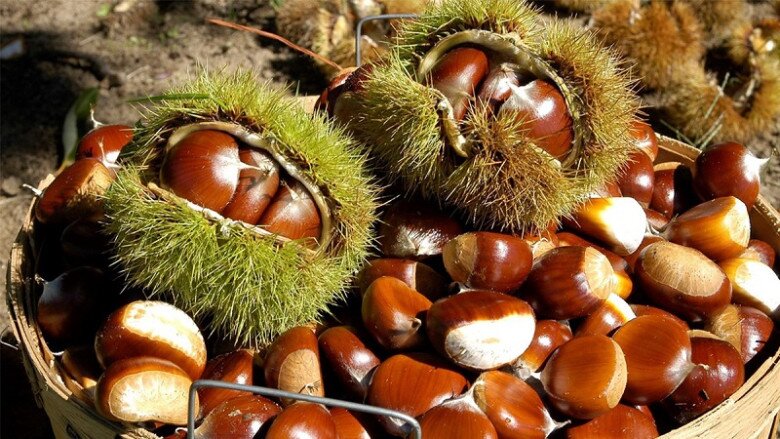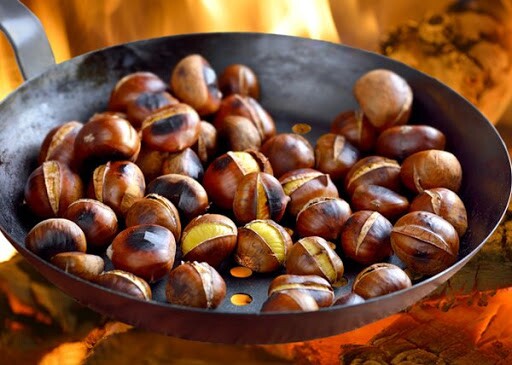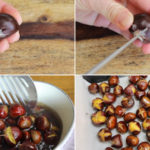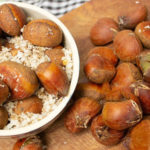Chestnuts offer a plethora of health benefits and are a highly nutritious food source. With a rich content of natural fats, vitamins, and minerals, they are a true superfood. Modern research has revealed that 100g of chestnuts contain 97 calories, 0.1g of fat, 23.9g of carbohydrates, and an impressive 8.1g of fiber. They are also a good source of potassium, manganese, copper, vitamin B6, and riboflavin, to name a few.

Chestnuts are considered a gift from nature, often referred to as “forest blessings.” They are not only nutritious but also possess medicinal properties, making them a valuable ingredient in traditional medicine. According to Ly Dong Bùi Đắc Sáng (Hanoi Oriental Medicine Association), chestnuts have a sweet taste and a warming effect on the spleen, stomach, and kidneys. They are believed to strengthen the kidneys and essence, promote bone and joint health, enhance digestion, nourish the stomach, and stop bleeding. Chestnut is also used to treat diarrhea caused by spleen and stomach weakness, as well as back and knee pain resulting from kidney deficiency.
Here are some of the notable health benefits associated with chestnuts:
**Promoting Cardiovascular Health:** Chestnuts contain antioxidants that help reduce inflammation and improve cardiovascular health. They are also a source of magnesium and potassium, which can lower the risk factors associated with cardiovascular disease.
**Boosting Brain Function:** The presence of several B vitamins, including vitamin B6, riboflavin, thiamine, and folate, in chestnuts contributes to maintaining a healthy brain and protecting against neurodegenerative disorders. These vitamins also help prevent conditions such as Alzheimer’s disease.
**Supporting Bone Health:** Chestnuts are rich in calcium, vitamin K, magnesium, and copper, all of which are essential for improving bone health. Consuming chestsearchdata suggests that they can help reduce the risk of osteoporosis and lower the rate of bone fractures.
**Blood Pressure Control:** Chestnuts are a good source of the essential mineral potassium, which helps the kidneys eliminate excess sodium from the body through urine. Excess sodium can lead to high blood pressure. Chestnuts also help relax blood vessels, contributing to lower blood pressure.

While chestnuts offer numerous health benefits, it is important to consume them in moderation and be mindful of any potential side effects. Ly Dong Bùi Đắc Sáng cautions that those with poor digestion should avoid overeating chestnuts as they are high in starch and can be difficult to digest, potentially leading to constipation. For individuals with stomach ailments, excessive chestnut consumption can increase stomach acid production, placing additional strain on the stomach and potentially exacerbating conditions such as stomach pain, stomach ulcers, and even stomach bleeding. It is recommended to refrain from overeating chestnuts, even for healthy individuals, as they can induce heat and internal warmth.
**Timing Your Chestnut Consumption:** Due to their high nutritional content, chestnuts can be challenging to digest, so it is advisable to avoid consuming them at night. Eating chestnuts in the evening may contribute to weight gain and obesity. Instead, opt for having chestnuts during snack times, such as between 9-10 am or 3-4 pm.
**Selection and Storage:** When choosing chestnuts, especially wild chestnuts, it is crucial to inspect them carefully as they may have been lying on the ground for some time and could be moldy. Moldy chestnuts can produce the toxic compound Afflatoxin, which is linked to liver cancer. Always check the color inside the nut, and if it appears altered, discard it. Additionally, if the chestnut does not taste fatty, it is best to throw it away, as it may be of inferior quality or already spoiling. To prolong their shelf life, store chestnuts in a box or tray in the refrigerator. Do not consume raw chestnuts.
Chestnuts are a delicious and nutritious treat, offering a range of health benefits. However, as with all foods, moderation and awareness of potential side effects are essential to ensuring a positive experience.
How Many Calories Are in Chestnuts? Can Eating Chestnuts Make You Fat?
The humble chestnut is a culinary delight, and we’re here to uncover all there is to know about this wondrous nut. From its humble origins to its versatile uses in the kitchen, we’ll be exploring the fascinating world of chestnuts and why they’re worth celebrating. Join us on this tasty journey as we crack open the secrets of the chestnut, one delicious morsel at a time.


































